To mark the holiday season, Prishtina Insight asked various authors from the Balkans to share some of their favorite books they read in 2016.
Authors from Kosovo, Albania, Croatia, Serbia, and Macedonia listed both recent publications and old editions of books that have become timely once more. Most of the recommendations are available in English, but some can be found only in the original languages of their publication.
Some of our select authors are in conversation with each other: Sasa Ilic’s favorite book is Barbara Matejcic’s “Kako Ste?” (“How are you?”), while Milos Zivanovic prefers Ilic’s book “Lov Na Jezeve” (“Sea urchin hunt”). Nikola Madzirov has spent the year catching up on new translations, like Raduan Nassar’s “Ancient Tillage” published this year by Penguin, and Alejandra Pizarnik’s poems in English. Other poetry recommendations include the recent republication of Seamus Heaney’s “Death of a Naturalist” by Genc Kadriu, and Albanian poetess Luljeta Lleshanaku’s “Homo Antarcticus” by fellow-poet Lisandri Kola.
With right-wing movements rising in the world, it seems timely to recommend Hannah Arendt’s classic “The Origins of Totalitarianism,” as Barbara Matejcic does. In a similar fashion, Alida Bremer recommends Kjell Westo’s “Hagring 38” (Mirage 38) set in 1930s Helsinki, which manages to capture in a thrilling plot both Finland and Europe on the eve of the Second World War. Meanwhile, Elvira Dones recommends the entire oeuvre of Clarice Lispector, a Brazilian author of Jewish origin whose family moved away from Ukraine when she was little.
The list is neither extensive nor exhaustive, but it’s a good place to start this holiday season. Enjoy!

Alida Bremer
Helsinki in the late 1930s: The lawyer Claes Thune is a member of the Swedish-speaking minority in Finland and a part of the privileged social class along with his friends – two doctors, a journalist, a businessman, and an actor. It is the time of the rise of fascism and national-socialism in Europe and this circle of friends on the northern edge of the continent shows its first cracks. The actor, the only Jewish member of the group, tries to point to growing anti-semitism, but ends up being considered ultimately too sensitive and even mentally ill. Matilda Wiik, a reliable and discrete secretary, works in the office of Claes Thune. She has a secret – the secret of her social origin and of her past. She comes from the working class, and her family was a victim in the Finnish Civil War, which ruled between the Reds and the Whites after 1918. She carries a trauma from that time, and in her boss’s circle of friends, she meets one of her tormentors.
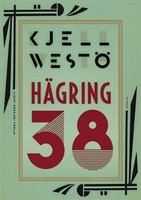
In “Hagring 38” (Mirage 38), published in 2013 the book’s author Kjell Westo, one of the most famous Swedish-language authors from Finland, develops the drama around this encounter in a wonderful and thrilling plot. The personalities of the protagonists are developed with nuanced characteristics, creating a picture of society in which the whole cruelty of the national-socialist ideology is announced. The author described in a very impressive way how the right ideology slowly becomes the common sense between the family members and friends of the main protagonist. I have rarely read such an exciting and at the same time richly informative book, from which I learned much not only about Finland, but about the whole of Europe on the eve of the War, and even a lot about the human soul.
Alida Bremer is a German-Croatian writer and translator based in Munster, Germany. Her most recent novel is “Olivas Garten” (Oliva’s Garden), published in 2013.

Milos Zivanovic
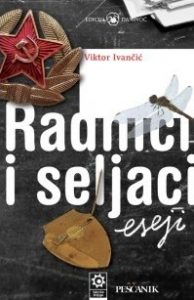
One of my discoveries in 2016 is the fact that Veton Surroi is such a great writer. I knew some of his biography, but I didn’t know how good his fiction was. His “Billionaire” (originally in Albanian, translated into Serbian) took me by surprise. I share some of his memories presented in the book, but just the most benign part of them – I salute the people who have survived and managed to stay more or less sane.
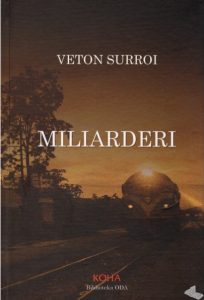
Viktor Ivancic, the founder and long-time editor of the Croatian weekly political magazine Feral Tribune based in Split, is one of my all times favorites. Nevertheless, I somehow managed to fail to read his “Workers and Peasants” (“Radnici i Seljaci” in the original Croatian) a whole two years after the original publishing. I believe he is one of those precious people who can write equally well in journalistic style and in fiction novels, and who is willing and able to react to unreasonable and inhuman Balkan and European bullshit.
Sasa Ilic is my friend, but that’s no reason not to say that he has written a good book, a collection of stories called “Lov na ježeve” (“Sea Urchin Hunt”). I will dare to say that a story titled “Casablanca Blue” is especially well written. It is about Edith Barakovich, a photographer originating from Zemun, Belgrade, who finds the end of the road in Casablanca. Her destiny is in some important points so similar to the path of Walter Benjamin.
Yet another great novel, although not really new, is Viktor Pelevin’s work titled “T” – and that is because Tolstoy is its central character. It’s a great work indeed.
I found a little old book by Branko Copic, a collection of his early short stories, titled “Parohija tužnog đavola” (“County of The Sad Devil”). It is so good that I have to steal something from it.
Milos Zivanovic is a Serbian writer and editor. He is the co-founder and co-editor of KPZ Beton. He has published multiple short story books and lives in Belgrade.

Elvira Dones
For me, 2016 has been a year full of books of many fields. Stopping by only at literature, I would pick out the whole work of Clarice Lispector. Experimentally and on a whim, I decided to read Lispector’s narrative chronologically, by publishing date, excluding her 86 stories which I read separately in a collection.
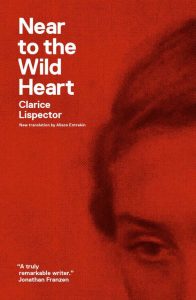
Lispector has rightfully earned her spot in Brazilian, Latin American, and world literature. Although she is less known in Europe, literary critics and scholars have many times considered Lispector to be the successor of Franz Kafka and Virginia Woolf. In spite of that, Lispector was not fond of labels and disregarded them. She published her first novel, “Near to the Wild Heart,” when she was only 23 years old. Her last one, “The Hour of the Star,” was published on the eve of her 57th birthday, and she died immediately after in 1977. In the five decades, Lispector produced a substantial, brilliant and eclectic work with an undoubtedly unique style.
Elvira Dones is a bilingual novelist and writer (Albanian and Italian). She has published several books and directed a series of documentaries. Her novel “Sworn Virgin” is also available in English.

Nikola Madzirov
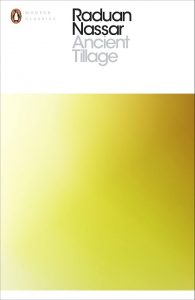
The novel “Ancient Tillage” (original title in Portuguese – “Lavoura Arcaica”) by the Brazilian author with Lebanese origin Raduan Nassar (1935) was first published in 1975. Afterwards, Nassar published a novella and few short stories, and in 1984, he stopped writing in order to become a farmer. Penguin Modern Classics published his novel in English this year and brought back his voice to the world as a well preserved seed of an ancient wild plant. I love the intensity of Nassar’s writing, both sharp and lyrical, and the fusion of the erotic, natural and mystical layers among his words. He writes: “The earth, the wheat, the bread, our table and our family (the earth); within this cycle, our father used to say in his sermons, there is love, work and time.“
I would also recommend the selected poems by the Argentinean poet Alejandra Pizarnik, “Extracting the Stone of Madness: Poems 1962-1972,” published by New Directions this year. Here are some of her lines: “Tomorrow / they’ll dress me in ash for the sunrise, / they’ll fill my mouth with flowers. / I’ll learn to sleep / inside the memory of a wall, / on the breath / of a dreaming animal.“
Nikola Madzirov is a Macedonian poet, translator and editor, whose poetry has been translated in thirty languages. “Remnants of Another Age” a collection of Madzirov’s poetry in English was published in2011. He lives in Berlin.

Genc Kadriu
It’s difficult to write about and choose books when you don’t read them. Only parts of books. A piece here and there. It could be for metabolic reasons, or because in one form or another, we’ve seen it all: from the Gentleman of La Mancha to Ulysses.
I don’t read anymore because I don’t have the patience and motivation to look for the books I could read. Despite that, last year I reread the debut collection of the poems by the Irish writer, Seamus Heaney, “Death of a Naturalist” (2016). A master of onomatopoeia and simile. A colossus of European poetry, alas, not translated into Albanian, therefore fairly unknown to the wider public in Kosovo.
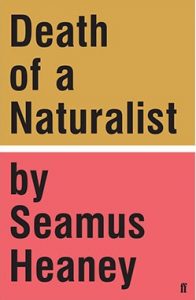
The poem entitled “Digging” describes the poet’s father digging in the bog. The admiration of working the land in his family farm turns into poet’s individual preference for writing. “…Between my finger and my thumb, the squat pen rests. I’ll dig with it.” The poem is about the childhood innocence of a young boy who goes to a flax-dam summer after summer to collect frogspawn and watch tadpoles hatch in the jars on window sills. One day, he is terrified when, because as it seems to him, the angry frogs were angry and about to take revenge. The poem ends, “I sickened, turned, and ran. The great slime kings were gathered there for vengeance and I knew that if I dipped my hand the spawn would clutch it.” The collection contains 34 poems; each a flawless gem in its own right.
Towards the end of the 50s, Jorge Luis Borges, as he himself stated, because of the “lazy pleasure for useless knowledge,” dug in bookshelves of his friends and vaults of the National Library of Argentina and selected the material for his Handbook of Fantastic Zoology, following and translating the sources from their original languages – Medieval Latin, French, Italian, German, Spanish and further commissioning Eastern language experts “as for his his invincible ignorance” of them.
The edition I have is from 2002 published by Vintage under “The Book of Imaginary Beings.” In the preface of the first edition of 1957, a child is taken to the zoo for the first time. But, instead of feeling alarmed and scared, he enjoys it. Some say because of this he’ll grow up a neurotic. Some that this is because children are explorers by definition. Another explanation brings on the fact that his toy tiger and the images in books have taught him to look at the real tiger without fear. Plato suggests that the child has already seen the tiger in the primal world of archetypes, therefore he recognizes it. Schopenhauer claims that the child looks fearlessly at the tiger because he himself is the tiger and the tigers are him.
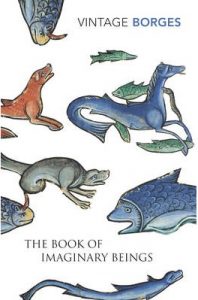
Furthermore they are part of the one and the same essence, the Will. From here, the author invites us to pass from the zoo of reality to the zoo of mythology, where the fantastic creatures are combinations of real beings. Because these permutations border on the infinite, the number of imaginary beings is very large. But, according to the author, this doesn’t happen in reality. Anyone looking into the pages of this handbook will see that the zoology of dreams is far poorer than the zoology of the Maker. From the gigantic Bahamut whose sight the eyes of men cannot bear, The Monkey of the Inkpot who drinks the writer’s leftover ink, one legged Rain Bird, the vengeful snake-woman ex-wife of Adam, who gave to Eve the forbidden apple, extraordinarily nimble Odradek that can never be laid hold of, and many more. Do find this (ever uncompleted) lexicon of fantasy and human speculation; imaginary creatures throughout space and time. Who knows, you too, dear reader, might one day enrich it with a new entry about some wondrous being.
Genc Kadriu is a Kosovo poet and artist. His poetry and other writing has been published in various collections, journals and text books. He lives in Prishtina.

Barbara Matejcic
My recommendation for reading will go to “The Origins of Totalitarianism” (1951) by political theorist Hannah Arendt, who described and analyzed the mechanism of totalitarian political movements of the 20th century. An old book for understanding new times. Considered one of the most important works of political philosophy of its time, today Arendt’s “Origins” reads more like a contemporary analysis of current political climate. It provides great markers to better understand growing movements based on xenophobia, racism and fundamentalism. We don’t have the horrors of concentration camps and gulags, that’s true, but political propaganda behind the genocidal totalitarian regimes that Arendt described could have been ripped from many worldwide media headlines today. As Arendt points out, the refusal and failure to take the threat of totalitarianism seriously often enabled those movements to seize power. So the number of parallels we can easily recognize should set off some alarms. It’s the book which will keep you awake, by all means.
Barbara Matejcic is a Croatian journalist and author based in Zagreb. Her most recent book, “Kako Ste?” was published earlier this year.

Sasa Ilic
Croatian journalist Barbara Matejcic’s book “Kako Ste?” (“How are you?”) represents a serious breakthrough in journalism of the category par excellence. The author has chosen people with six different fates and brought us their stories, mostly in the third person (“August in Šarić Struga,” “Top marks from the back benches,” “A normal day in Branimir’s life,” “The Lovric family of Osijek” and “Long live pussy”), while the story “One in a hundred,” about a young woman who suffers from schizophrenia, is written in the form of diary notes about the disease in the age of capitalism. This story best paints a picture of the status of all these heroes in an environment full of intolerance. It is primarily about women, whether they are paralyzed after a car accident, or young Roma women in schools governed by a strong segregation or lesbians who get beaten up by angry young men. Of particular note too is “The Lovric family of Osijek,” which tells about the war in Slavonia and the suffering of a Serbo-Croatian, Yugoslav family in the executions carried out by units of Branimir Glavas. The common denominator of all these stories is not really otherness as such, but the more militant response of the community in touch with others. If a literature festival existed in the region similar to Slobodna Zona (“Free Zone”), which promotes engaged cinematography, the brave and engaged book How are you? By Barbara Matejčić would receive well-deserved attention.
Sasa Ilic is a writer from Belgrade and the co-editor of the POLIP Literary Festival in Prishtina.

Lisandri Kola
Regarding books I read in 2015, I might not be able to pin down too many due to the numerous personal projects that I had. But, this does not mean that I have neglected to read books, be they in Albanian or other languages. One worth mentioning is Luljeta Lleshanaku’s poetry collection entitled “Homo antarcticus” (2015). These poems are an (im)personal confession of the poet in an emotional state that evokes a feeling that many pseudopoems found in shops and fairs in the albanosphere are deficient in. I would say that this corpus of 30 poems intentionally lacks figurativeness, allowing for a style without much embellishment. The verse sometimes touches on intertextuality, a way of modern communication in poetry.
Lisandri Kola is an Albanian poet and literary scholar. He has published several poetry collections and some of his poems have been translated in Montenegrin (read one of his poems in English here). He lives in Shkoder.
All illustrations by Jeta Dobranja/Trembelat.
Correction December 25, 2016: a previous version of this article mistakenly claimed Nikola Madzirov has published over thirty books. His poems have been translated in thirty languages.





